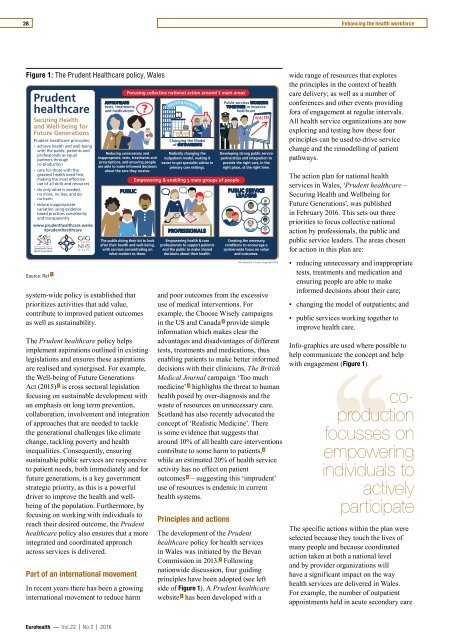EUROHEALTH
Eurohealth-volume22-number2-2016
Eurohealth-volume22-number2-2016
You also want an ePaper? Increase the reach of your titles
YUMPU automatically turns print PDFs into web optimized ePapers that Google loves.
28<br />
Enhancing the health workforce<br />
Figure 1: The Prudent Healthcare policy, Wales<br />
wide range of resources that explores<br />
the principles in the context of health<br />
care delivery; as well as a number of<br />
conferences and other events providing<br />
fora of engagement at regular intervals.<br />
All health service organizations are now<br />
exploring and testing how these four<br />
principles can be used to drive service<br />
change and the remodelling of patient<br />
pathways.<br />
Source: Ref 1<br />
system-wide policy is established that<br />
prioritizes activities that add value,<br />
contribute to improved patient outcomes<br />
as well as sustainability.<br />
The Prudent healthcare policy helps<br />
implement aspirations outlined in existing<br />
legislations and ensures these aspirations<br />
are realised and synergised. For example,<br />
the Well-being of Future Generations<br />
Act (2015) 2 is cross sectoral legislation<br />
focusing on sustainable development with<br />
an emphasis on long term prevention,<br />
collaboration, involvement and integration<br />
of approaches that are needed to tackle<br />
the generational challenges like climate<br />
change, tackling poverty and health<br />
inequalities. Consequently, ensuring<br />
sustainable public services are responsive<br />
to patient needs, both immediately and for<br />
future generations, is a key government<br />
strategic priority, as this is a powerful<br />
driver to improve the health and wellbeing<br />
of the population. Furthermore, by<br />
focusing on working with individuals to<br />
reach their desired outcome, the Prudent<br />
healthcare policy also ensures that a more<br />
integrated and coordinated approach<br />
across services is delivered.<br />
Part of an international movement<br />
In recent years there has been a growing<br />
international movement to reduce harm<br />
and poor outcomes from the excessive<br />
use of medical interventions. For<br />
example, the Choose Wisely campaigns<br />
in the US and Canada 3 provide simple<br />
information which makes clear the<br />
advantages and disadvantages of different<br />
tests, treatments and medications, thus<br />
enabling patients to make better informed<br />
decisions with their clinicians. The British<br />
Medical Journal campaign ‘Too much<br />
medicine’ 4 highlights the threat to human<br />
health posed by over-diagnosis and the<br />
waste of resources on unnecessary care.<br />
Scotland has also recently advocated the<br />
concept of ‘Realistic Medicine’. There<br />
is some evidence that suggests that<br />
around 10% of all health care interventions<br />
contribute to some harm to patients, 5<br />
while an estimated 20% of health service<br />
activity has no effect on patient<br />
outcomes 6 – suggesting this ‘imprudent’<br />
use of resources is endemic in current<br />
health systems.<br />
Principles and actions<br />
The development of the Prudent<br />
healthcare policy for health services<br />
in Wales was initiated by the Bevan<br />
Commission in 2013. 7 Following<br />
nationwide discussion, four guiding<br />
principles have been adopted (see left<br />
side of Figure 1). A Prudent healthcare<br />
website 1 has been developed with a<br />
The action plan for national health<br />
services in Wales, ‘Prudent healthcare –<br />
Securing Health and Wellbeing for<br />
Future Generations’, was published<br />
in February 2016. This sets out three<br />
priorities to focus collective national<br />
action by professionals, the public and<br />
public service leaders. The areas chosen<br />
for action in this plan are:<br />
• reducing unnecessary and inappropriate<br />
tests, treatments and medication and<br />
ensuring people are able to make<br />
informed decisions about their care;<br />
• changing the model of outpatients; and<br />
• public services working together to<br />
improve health care.<br />
Info-graphics are used where possible to<br />
help communicate the concept and help<br />
with engagement (Figure 1).<br />
production<br />
focusses on<br />
empowering<br />
‘‘co-<br />
individuals to<br />
actively<br />
participate<br />
The specific actions within the plan were<br />
selected because they touch the lives of<br />
many people and because coordinated<br />
action taken at both a national level<br />
and by provider organizations will<br />
have a significant impact on the way<br />
health services are delivered in Wales.<br />
For example, the number of outpatient<br />
appointments held in acute secondary care<br />
Eurohealth — Vol.22 | No.2 | 2016
















